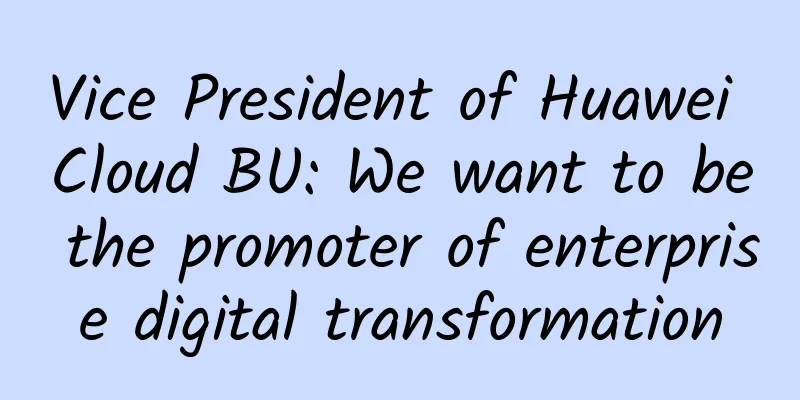China Unicom's mixed ownership reform is the trigger for the restructuring of the telecommunications industry order

|
How will China Mobile and China Telecom respond to China Unicom's mixed ownership reform? Will this lead to a restructuring of the telecommunications industry? The efficiency of business determines the competitiveness of an enterprise, and the organization and process serve the business. From this perspective, a more efficient business will inevitably require a more efficient organizational operation model. Business is the entrance to analysis. 1. Traffic explosion vs. organizational slimming down The essence of the various Internet card services launched by China Unicom is to lock users to one Internet manufacturer, so that the Internet manufacturer can maximize the ability to monetize these users' traffic. Business is profit-oriented. Internet manufacturers have no love for China Unicom, but the problem is that users may also have no love for China Unicom. If you ask the users of the Big and Small King Cards whether they are Tencent users or China Unicom users, what do you think the users will say? From a certain perspective, the launch of Internet cards has made operators more pipeline-oriented. For the three domestic operators, China Telecom has also launched Internet cards with iQiyi, Toutiao, etc., but not as loudly as China Unicom. For China Mobile, the largest operator in China, Internet cards are obviously not in its interest, so the action is the slowest. Internet cards are equivalent to a type of high traffic and low profit. Once China Mobile launches them, a large number of users will transfer to Internet cards, which will reduce the contribution of users with high URP values. Therefore, China Mobile launches mostly cheap traffic for targeted videos, which does not affect users with high URP values and maintains good profits to a certain extent. However, in the long run, if many users go to China Unicom and China Telecom, China Mobile will not be able to bear it, because user loss will not only reduce revenue, but also significantly increase the network cost per user, and price cuts will be inevitable.
The telecommunications industry is moving towards thin profits, and China Unicom’s mixed-ownership reform has accelerated this pace, not to mention the broader context of “speeding up and reducing fees”. From the perspective of data traffic itself, the profits of the telecommunications industry will decline sharply. For operators, whether to shrink their business and focus on the stability of their own business or to strive to expand externally and find new granaries has become a strategic choice. For China Unicom and China Telecom, the relevant strategy is relatively simple. When the user base is basically saturated, they can grab China Mobile's users at a low price. Without users, everything is empty talk. For China Mobile, which has been unfavorable in its external expansion for many years, it becomes particularly important to "pacify the country before resisting foreign aggression" or "strategic long march". 2. Building a cloud for others to use vs. building your own cloud for others to use In the IDC market, a landmark event occurred in 2017. While the three major domestic operators were in full swing in building data centers and promoting cloud computing business, the largest and second largest wireless operators in the United States, Verizon and AT&T, announced their withdrawal from the cloud business. CenturyLink, the third largest telecommunications operator in the United States, has sold its 57 data centers and co-managed businesses to the fund for $1.86 billion. According to foreign media reports, CenturyLink believes that the company's greatest value lies in network resources, not in who the physical assets of the data center belong to. In the future, CenturyLink will continue to sell hosting and network connection services. The wind blowing from the other side of the ocean is quite meaningful. Early cloud computing was generally provided by three types of vendors. The first type was traditional operators, which evolved from the original IDC business and had advantages in physical locations and transmission. The second type was cloud computing vendors that started out as virtualization vendors for enterprises, the most typical of which were VMware, Cisco, HPE, etc., which had advantages in virtualization technology. The third type was enterprises that had to use a large amount of cloud computing resources for their own business and did "side jobs" when the resources were idle. Judging from the situation in the United States, mainstream operators and companies such as VMware and Cisco have withdrawn from the cloud computing market. In the future, the four major cloud computing service providers, Amazon, Azure, Google and IBM, will dominate the market. Looking at China, due to government protection, foreign forces cannot enter. In the future, Alibaba Cloud and Tencent Cloud may dominate the market. However, there is a second type of manufacturer in China that is also working hard to expand its cloud business, that is Huawei. On September 5, 2017, Huawei held the 2017 All Connected Conference in Shanghai. At the conference, Huawei's Vice Chairman and Rotating CEO Guo Ping said that after a year of development, Huawei's cloud strategy has become clearer. Huawei has the determination and ability to build one of the world's top five clouds with its partners. Well, the war is still going on, and there are not many tickets for cloud admission. Let us wait and see whether Huawei Cloud can rise as quickly as Huawei's large network equipment and terminals. The cloud service after China Unicom's mixed-ownership reform is likely to be "selling dog meat under the guise of sheep meat". China Telecom Cloud (supported by Huawei) still has a relatively high market share in the domestic market, but as Huawei has also begun to provide public cloud services, the future cooperation between the two companies will be more delicate. China Mobile does not seem to have an influential cloud service yet. Regarding the cloud services of operators, the core issue is, in the absence of strong technical and business support, to what extent can the cloud be done well with the advantages of transmission and physical computer rooms alone? 3. You can’t learn by just watching The collision of data can bring infinite magic, especially the operator's own full amount of user data will be a gold mine for the operator. After China Unicom's mixed-ownership reform, it can not only use the advanced tools of Internet manufacturers to mine, but also more likely to cross-domain association with the Internet manufacturers' own data, thereby realizing data monetization. For the latter, China Mobile and China Telecom may only be able to watch stupidly. Who made you not have such a good friend with blood relationship. 4. Single business support channel VS multi-business support channel If a store sells a variety of products, it will increase the chances of sales for customers, and the cost of offline channels will be evenly shared by multiple businesses. This model is not new. In Hong Kong's 7-11, you can easily buy mobile phone cards and recharge. In Japan, you can pay water and electricity bills at SoftBank's business hall. Offline channels are increasingly converging. The attractiveness of China Unicom's offline channels will increase and costs will decrease. Telecom and Mobile are expected to follow this path in the future. On March 1, 2017, China Unicom released its annual report. The company's net profit for 2017 is expected to be about 430 million yuan, an increase of about 177.6% year-on-year. After deducting the non-recurring gains and losses of asset scrapping losses related to optical fiber conversion, the net profit is expected to be about 990 million yuan, an increase of about 1808.3% year-on-year. The number of mobile account users increased by 20.34 million, reaching 284 million, of which 4G users increased by 70.33 million, reaching 175 million. China Unicom made a profit for the first time after it suffered losses last year, and the number of users increased on a large scale, which can be attributed to the pull of Internet cards. From the 70 million new 4G users, how many defected from China Mobile? And how many were half-hearted (China Unicom occupied the second card slot)? I believe that the annual report of China Mobile will reveal the answer. In summary, the decline in profits in the telecommunications industry will be an inevitable trend, and the decline in profits will definitely lead to changes in personnel and organizations, the most obvious of which is the budget cuts, personnel and organizational cuts. For enterprises, the normal survival of the fittest is a normal organizational cycle. I can't help but think of a joke when I was in the system: "If 1/4 of the current employees are cut, the company will run more smoothly because no one has time to argue!" This is still within China Mobile. According to my subjective and incomplete evaluation, China Mobile is generally good, and China Unicom and China Telecom may be worse. The decline in profits will be a signal. It is expected that operators will slim down in multiple dimensions, and slimming itself has changed the original pattern and built a new order. Compared with being big and bloated, perhaps being smaller will be more beautiful. |
<<: The first batch of 5G mobile phones are coming. What are the "killer" applications?
>>: [Sharing] Project Practice of Network Automation: Scenarios, Tools and Solutions
Recommend
Ruishu Information: The fast-moving consumer goods industry faces severe API attacks, and API security governance is imperative
In the digital age, traditional fast-moving consu...
The three major operators are launching preferential packages. How do you “change to a new one”?
Recently, some mobile phone users have found that...
Maxthon Hosting: Los Angeles data center connected to AS9929 line, 20% discount, monthly payment starting from 38 yuan
Aoyou Host is a long-established foreign VPS host...
Paving the way for innovative applications, all-optical networks are moving from enterprises to ordinary people's homes
[[386853]] From dial-up to ADSL, and then to fibe...
What are the characteristics of 5G? A few keywords will help you understand
5G (fifth-generation mobile communication technol...
DMIT Triple Network CMIN2 Backhaul $39.9/year-1GB/10G SSD/800GB@1Gbps/Los Angeles Data Center
DMIT.io has newly launched the LAX EB series of C...
Halfway through 2020: my country's 5G users exceed 100 million
Although we have not yet completely gotten rid of...
The 2G era will not come to an abrupt end; network transformation requires the support of the Internet of Things
Recently, China Unicom announced that it will car...
PhotonVPS: $4/month KVM-2GB/30GB/2TB/Los Angeles & Dallas & Chicago, etc.
It's been a long time since I shared the news...
Eight use cases for NV overlay
Most IT organizations are under pressure to be mo...
Top 10 Network Monitoring Software and Visibility Tools
If you need to understand what's happening on...
What are the differences between HTTP and HTTPS besides security?
HTTP and HTTPS are two common network protocols, ...
spinservers: San Jose 10Gbps bandwidth server starting at $109/month, upgradeable to 1Gbps unlimited data
spinservers is a site under Majestic Hosting Solu...
CloudCone Christmas promotion, Los Angeles MC data center KVM VPS annual payment starts from $12.7
CloudCone is a sub-brand of Quadcone, founded in ...
ZJI: Hong Kong VDS Superset Series 20% off 450 yuan/month, Platinum 8352Y/16G memory/240G SSD/10M CN2+BGP
ZJI is the original well-known WordPress host Wei...









